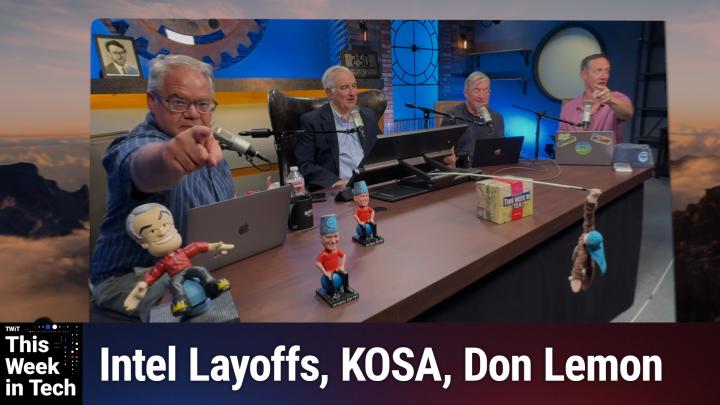Intel’s Very Rough Week
Created with AI. Edited by humans.
Intel's Fall from Grace: TWiT Hosts Analyze the Chip Giant's Struggles
In a recent episode of This Week in Tech (TWiT), host Leo Laporte and guests Jason Howell, Jason Snell, and Alex Lindsay dove deep into Intel's current predicament, discussing how the once-dominant chip manufacturer found itself in troubled waters.
The discussion kicked off with a stark comparison between Intel's dismal week and Apple's recent financial success. Alex Lindsay pointed out that Intel faces mounting pressure from multiple fronts, including Apple's M-series processors and the growing interest in ARM-based chips across the industry. "Apple lit a fire under everyone to look at ARM," Lindsay noted, highlighting how this shift has put Intel under significant strain.
Jason Snell expanded on this point, describing it as a "one-two punch" against Intel. Not only did they lose Apple as a customer, but Apple's demonstration of efficient ARM-based computers has prompted other PC manufacturers to explore alternatives to Intel chips. This trend has led to the introduction of Qualcomm-based PCs, further eroding Intel's market position.
The conversation then turned to Intel's recent technical issues. Leo Laporte mentioned that Intel's 13th and 14th-generation Core processors have been experiencing crashes, potentially causing permanent damage to some systems. This development has forced Intel to extend warranties and prepare microcode updates, adding to the company's woes.
Perhaps the most sobering news discussed was Intel's announcement of a 15% workforce reduction, amounting to about 15,000 jobs lost. Jason Snell observed that while Intel's current management seems to understand the challenges they face, they're "paying the price for years of mismanagement and difficult circumstances."
The hosts drew parallels between Intel's situation and other tech giants who failed to adapt to changing markets. Snell described it as a "textbook innovator's dilemma," where Intel clung to its traditional business model of designing and fabricating its own chips, rather than adapting to new market realities. Alex Lindsay added that this reluctance to change is common among large companies, often due to a mix of not wanting to give up current revenue streams and uncertainty about future prospects.
Leo Laporte raised an intriguing question about whether there's a history of successful companies finding "the next big thing" or if innovations typically come from unexpected places. Jason Snell pointed out that while there isn't a great track record, it's why tech giants like Apple, Google, Meta, and Microsoft invest heavily in research and development - they're all scrambling to find the next breakthrough to avoid obsolescence.
To hear the full, in-depth analysis of Intel's situation and other tech industry developments, be sure to listen to the complete episode of This Week in Tech, episode 991. The show offers expert insights and lively discussion on the latest technology news and trends.
